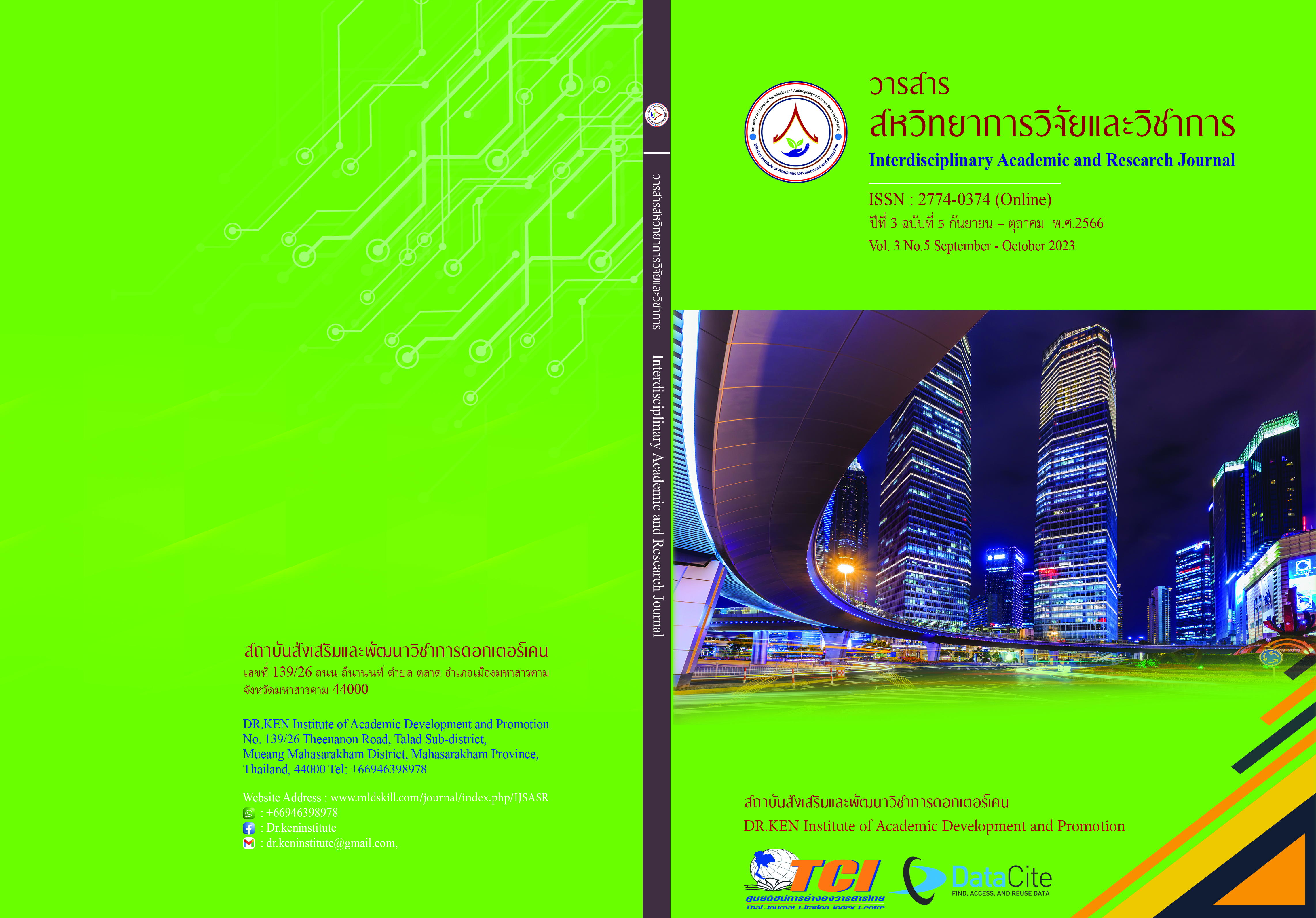The Effects of ASEAN Traditional Game Activities on the Coexistence in a Multicultural Classroom for Young Children
DOI:
https://doi.org/10.14456/iarj.2023.248Keywords:
Traditional Games; , ASEAN; , Coexistence; , Multicultural;, Young ChildrenAbstract
At present, Thailand has people of various nationalities living together. When those people have children, they send their children to study in school. Therefore, there are children from various nationalities in the class, but they cannot communicate with each other in Thai. When playing together, they do not understand each other, quarrel, and use inappropriate words and physical abuse. The researcher sees the importance of encouraging multicultural children living together to understand and accept their own and others’ cultures. This will help reduce conflicts. The objective of this study was to study the effects of ASEAN traditional game activities on coexistence in a multicultural classroom for young children. The target group was 30 of 4-6-year-old children who were studying in the 2nd semester of the academic year of 2022 in Sangam Wittaya School, Office for the Pathum Thani Primary Educational Service Area 1. The research instruments included the 24 lesson plans of ASEAN traditional game activities, a form of social behavior assessment of the coexistence in a multicultural classroom for young children, and notes of young children’s social behaviors. Data were analyzed by mean, standard deviation, and content analysis. The study showed that young children who received ASEAN traditional game activities had higher social skills the coexistence in a multicultural than before receiving the ASEAN traditional game activities. The highest aspects that young children achieved were as follows: acceptance of diversity, communication, rights respect, and coexistence. The children developed social skills through Thai ASEAN traditional games. It made the children accept other opinions, help each other, and interact and cooperate with their peers whose nationalities, languages, and cultures are different. They happily accepted and adapted to living together with friends who were different from themselves.
References
กระทรวงศึกษาธิการ. (2542). พระราชบัญญัติการศึกษาแห่งชาติ พ.ศ.2542. กรุงเทพฯ: โรงพิมพ์คุรุสภาลาดพร้าว.
จินตนา นิลทวี. (2564). การพัฒนาพฤติกรรมทางสังคมของเด็กปฐมวัยโดยใชกิจกรรมการละเล่นพื้นบ้านไทย.สิกขาวารสารศึกษาศาสตร์. 8 (1), 57-66.
จิรภรณ์ มั่นเศรษฐวิทย์. (2556). รูปแบบการจัดประสบการณ์เรียนรู้ SANTISUK เพื่อเสริมสร้างคุณลักษณะพึงประสงค์ของการอยู่ร่วมกันอย่างสันติสุขที่เหมาะสมกับเด็กปฐมวัยในพื้นที่สามจังหวัดชายแดนภาคใต้. วารสารพฤติกรรมศาสตร์ มหาวิทยาลัยศรีนครินทรวิโรฒ. 19 (1), 37-55.
ณัฐรุจา ท่าโทม. (2565). ผลการใช้กิจกรรมบทบาทสมมติเพื่อเสริมสร้างพฤติกรรมทางสังคมของเด็กอนุบาลในห้องเรียนพหุวัฒนธรรม. วารสารครุศาสตร์ จุฬาลงกรณ์มหาวิทยาลัย. 50 (3), 1-12.
ธนพร หมูคำ. (2546). การใช้กิจกรรมการละเล่นพื้นบ้านล้านนาเพื่อพัฒนาทักษะทางภาษาไทยของนักเรียนชั้นประถมศึกษาปีที่ 3. สารนิพนธ์ศึกษาศาสตร์มหาบัณฑิต สาขาการสอนภาษาไทย, มหาวิทยาลัยเชียงใหม่.
ธนวรรณ เอนก. (2565). การลดพฤติกรรมความขัดแย้งด้วยการจัดกิจกรรมบูรณาการการเล่านิทานและการจำลองสถานการณ์ในเด็กปฐมวัย. วารสารวิชาการและวิจัยสังคมศาสตร์. 17 (1), 159-172.
ปัทมา บรรเทิงจิต. (2548). การศึกษาทักษะทางสังคมด้านการเล่นกับเพื่อนของเด็กออทิสติกโดยการจัดกิจกรรมการละเล่นพื้นบ้านของไทยประกอบกับการสื่อด้วยภาพ. สารนิพนธ์ศึกษามหาบัณฑิต สาขาวิชาการศึกษาพิเศษ, มหาวิทยาลัยศรีนครินทรวิโรฒ.
พีรวัฒน์ ชลเจริญ. (2557). ผลของการจัดกิจกรรมพละศึกษาโดยใช้เกมการละเล่นพื้นบ้านอาเซียนที่มีต่อความฉลาดทางอารมณ์ของนักเรียนระดับชั้นประถมศึกษา. วิทยานิพนธ์ครุศาสตร์มหาบัณฑิต สาขาวิชาสุขศึกษาและพละศึกษา: จุฬาลงกรณ์มหาวิทยาลัย.
รสสุคนธ์ เนาวบุตร. (2557. แนวทางการจัดการศึกษาเรียนร่วมพหุวัฒนธรรม:กรณีศึกษาชุมชนบ้านป่าละอูอำเภอหัวหิน จังหวัดประจวบคีรีขันธ์. วิทยานิพนธ์ศึกษาศาสตรมหาบัณฑิต สาขาวิชาพัฒนศึกษา, มหาวิทยาลัยศิลปากร
วรพรรณ กระต่ายทอง. (2559). การพัฒนาหลักสูตรเสริมเพื่อพัฒนาทักษะทางสังคมสำหรับการอยู่ร่วมกันในสังคมพหุวัฒนธรรมของนักศึกษา. วิทยานิพนธ์ปรัชญาดุษฎีบัณฑิต สาขาวิชาหลักสูตรและการสอน, มหาวิทยาลัยศิลปากร.
สำนักงานเลขาธิการสภาการศึกษา. (2562). มาตรฐานการศึกษาของชาติ พ.ศ.2561. พิมพ์ครั้งที่ 1. กรุงเทพมหานคร: บริษัท 21 เซ็นจูรี่ จำกัด.
สิริมา ภิญโญอนันตพงษ์. (2559). การพัฒนารูปแบบการจัดการเรียนรู้คุณลักษณะความกตัญญููของเด็กปฐมวัย. วารสารวิชาการศึกษาศาสตร์ คณะศึกษาศาสตร์ มหาวิทยาลัยศรีนครินทรวิโรฒ. 17 (2), 1-12.
อมรรักษ์ สวนชูผล. (2560). การจัดการปัญหาแรงงานต่างด้าวโดยการมีส่วนร่วมของชุมชนในเขตจังหวัดปทุมธานี. วารสารวิจัยและพัฒนา วไลยอลงกรณ์ ในพระบรมราชูปถัมภ์. 12 (2), 145-157.
อมรวิชช์ นาครทรรพ. (2549). สันติวัฒนธรรมสันติในตน. กรุงเทพฯ: โรงพิมพ์แห่งจุฬาลงกรณ์มหาวิทยาลัย.
อังศุธร อังคะนิต. (2557). ผลของการจัดกิจกรรมการศึกษานอกระบบแบบมีส่วนร่วมเพื่อพัฒนาการละเล่นพื้นบ้านที่ผสมผสานภูมิปัญญาท้องถิ่นที่มีต่อทักษะทางสังคมของเด็กในชุมชน. วารสารการศึกษาออนไลน์. 9 (4), 27-40.
Aldridge, J., Calhoun, C. & Aman, R. (2000). 15 Misconceptions About Multicultural Education. Elementary, 12(3) 1-6.
Erikson, E. (1950). Young Man Luther: A study in Psychoanalysis and history. New York: Norton.
Frederic, F. (1852). Britannica Concise Encyclopedia; Friedrich Wilhelm August Froebel. Retrieved from http://www.answers.com/topic/friedrich-wilhelm-august-fr-bel.
Klein, T.E. (1992). Teaching Tolerance, Prejudice Awareness and Reduction in Secondary Schools. A thesis presented to the Faculty of the Dominican College Department of Education, California, May.
Kunzman, R. (2003). Religion, Ethics and the Implications for Moral Education: A Critique of Nucci's Morality and Religious Rules. Journal of Moral Education, 32(3), 251–261.
Mitchell, M. B., & Salsbury, E. R. (1999). Encyclopedia of multicultural education. British: Greenwood.
Shaffer, D. (1999). Developmental Psychology: Childhood & Adolescence. 5th edition. Pacific Grove: Brooks/Cole.
Vygotsky, L. S. (1978). Mind in society: The development of higher psychological processes. M. Cole, V. John-Steiner, S. Scribner, & E. Souberman (Eds.). Cambridge, MA: Harvard University Press.
Wilson, J.E. (2006). Investigating the Influence of Anti-racist Education in Achieving Prejudice Reduction Among Secondary Education Students. Retrieved from: http://proquest.umi.com.
Downloads
Published
How to Cite
Issue
Section
License
Copyright (c) 2023 Netrada Nueangnoi, Chalatip Samahito, Piyanan Hirunchalothorn

This work is licensed under a Creative Commons Attribution-NonCommercial-NoDerivatives 4.0 International License.
Copyright on any article in the Interdisciplinary Academic and Research Journal is retained by the author(s) under the under the Creative Commons Attribution-NonCommercial-NoDerivatives 4.0 International License. Permission to use text, content, images, etc. of publication. Any user to read, download, copy, distribute, print, search, or link to the full texts of articles, crawl them for indexing, pass them as data to software, or use them for any other lawful purpose. But do not use it for commercial use or with the intent to benefit any business.
















.png)


